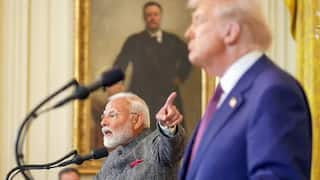Delhi Riots Case: Karkardooma Court Discharges Student Activists Umar Khalid And Khalid Saifi
Karkardooma court on Saturday discharged Umar Khalid and Khalid Saifi in Feb 2020 riot-related case.

New Delhi: Delhi's Karkardooma court on Saturday discharged Umar Khalid and Khalid Saifi in February 2020 riot-related case, reported news agency ANI. The order was pronounced today by Additional Sessions Judge Pulastya Pramachala in FIR 101/2020, which was filed at Police Station Khajuri Khas. In the FIR, both Saifi and Khalid are out on bail. However, they continue to be held in judicial custody in the UAPA case, which asserts that the riots were the result of a larger conspiracy.
Delhi's Karkardooma Court discharges Umar Khalid and Khalid Saifi in a riot-related case in February 2020.
— ANI (@ANI) December 3, 2022
Along with sections 3 and 4 of the Prevention of Damage to Public Property Act and sections 25 and 27, of the Arms Act, as well as sections 109, 114, 147, 148, 149, 153-A, 186, 212, 353, 395, 427, 435, 436, 452, 454, 505, 34, and 120-B of the Indian Penal Code, the FIR was filed.
On the basis of a constable's statement, the case was filed, stating that on February 24, 2020, a large crowd began throwing stones near Chand Bagh Pulia.
Khalid, Sharjeel Imam, and other individuals were charged with violating the Indian Penal Code and the Unlawful Activities (Prevention) Act (UAPA) anti-terror laws for allegedly being the "masterminds" of riots and protests that took place in northeast Delhi and the Jamia neighbourhood of Delhi in December 2019 and February 2020.
Also Read: Congress To Hold First Meeting Of Steering Committee On Sunday
Earlier before Delhi HC, Amit Prasad, a special prosecutor, had opposed Khalid's request for bail, arguing that the speech he gave in Amravati in February 2020 was "very calculated" and covered a number of topics, including the Babri Masjid, the triple talaq, Kashmir, the persecution of Muslims, the CAA, and the NRC, as well as calling for "street protests" against the government.
The protest against a legislation, according to Khalid's attorneys, was legitimate and permitted by the Constitution. In addition, Pais said that there was no proof of any call for violence, other than a nonviolent demonstration, and that the police had "cooked up" the claims of plot.
The claim that "women and children" were "deliberately brought in" from other places to "create" a demonstration, according to Pais, was also refuted by the facts.
On the other side, the prosecution contended that a "plot" took place in neighbourhoods with a significant minority population and that protest locations near mosques were identified.





































